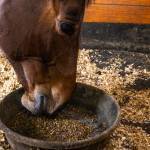Designing an Aflatoxin-Resistant Corn Strain

Plant scientists at the University of Arkansas are closing in on a transgenic corn strain that would not be affected by Aspergillus flavus, a fungus that grows on corn plants stressed by periods of hot, dry weather or sustained drought.
The fungus produces aflatoxin, a substance that can seriously impact the health of various farm animals. Horses and pigs are more susceptible to the effects of aflatoxin than ruminants such as cows and sheep. Aflatoxin-tainted corn can also affect humans who ingest it.
Horses that eat low levels of aflatoxin over a period of time can have decreased fertility and a weakened immune system. An acute reaction to the ingestion of a large amount of aflatoxin can cause horses to show depression, fever, colic, inappetence, liver and kidney damage, muscle spasms, convulsions, and even death.
Aflatoxin poisoning is rarely a problem in the U.S. and other developed countries where grains are screened for toxins before they are used for animal feed products. In other areas of the world where grain marketing is unregulated, animals and humans have died after ingesting aflatoxin from tainted corn.
To develop an aflatoxin-free strain of corn, plant pathologists used a gene isolated from the hyacinth bean that inhibits the alpha amylase enzyme activity required for growth of A. flavus and the accumulation of aflatoxin. The amylase inhibitor gene family member was then cloned into corn plants that are now being grown. Seeds from these plants will be tested to see if they show expression of the fungus-inhibiting gene. If a suitable plant line is found, it will be made available to plant breeders who will be able to develop improved strains of corn with the combination of traits best suited for the regions where they will be grown.








